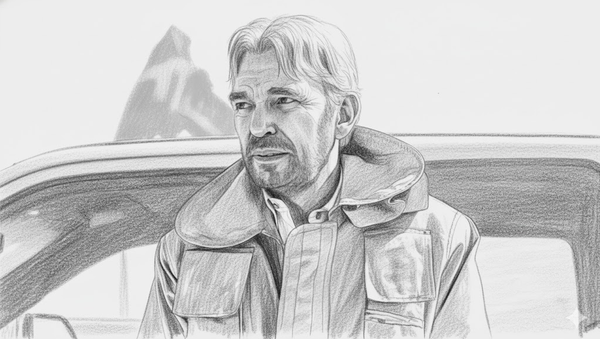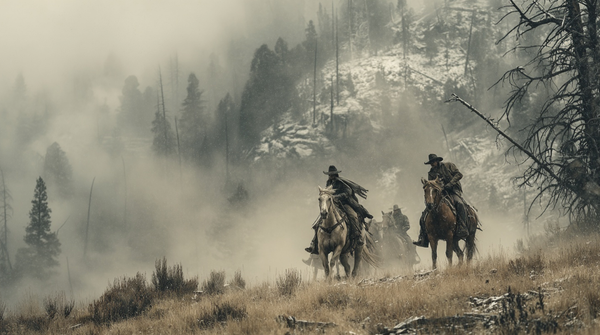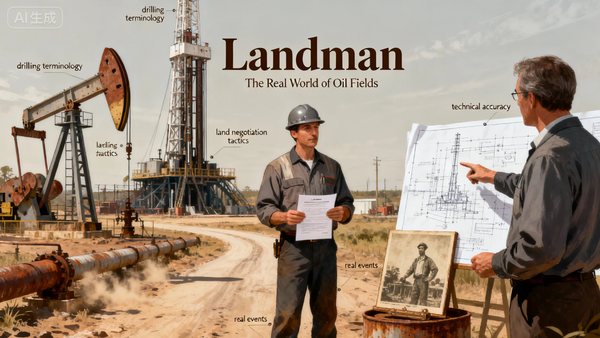Tommy Morris: The Complex Heart of Landman

In the unforgiving landscape of West Texas oil fields, where fortunes are won and lost with each pump of crude from the earth, Tommy Norris stands as the beating heart of Taylor Sheridan's Landman. Portrayed with weathered authenticity by Billy Bob Thornton, Tommy is not merely a character—he is a walking contradiction, a man caught between the ruthless demands of American capitalism and the tender vulnerabilities of human connection. His complexity transforms what could have been a straightforward oil industry drama into a profound meditation on survival, morality, and the cost of doing business in a world where everything has a price.landman.fandom+2
The Reluctant Executive: A Man Divided
Tommy Norris occupies an unusual position in the corporate hierarchy of M-Tex Oil. He is officially titled as both a landman and Vice President of Operations, but these formal designations barely capture the breadth of his responsibilities. In reality, Tommy functions as a fixer, crisis manager, negotiator, and the connective tissue between the boardroom and the roughnecks who risk their lives daily on the oil patch. He is the man called when a cartel plane collides with an oil tanker, when three workers die in a gas explosion, or when multi-million dollar deals hang in the balance.wikipedia+3
What makes Tommy particularly fascinating is his evident discomfort with power. Unlike the archetypal corporate climber, Tommy harbors no illusions about the glamour of his position. He is, by his own admission, $500,000 in debt—a casualty of the oil industry's brutal boom-and-bust cycles. He shares a cramped house with two roommates, chain-smokes through stress, and nurses beers while trying to hold together an operation that threatens to unravel at any moment. When Season 1 concludes with Tommy being named president of M-Tex following Monty Miller's death, his response is not triumph but resignation.deadline+3
"I think Tommy is still always going to be a landman at heart, and I think he's a reluctant president," Thornton explained in interviews. "So he's not really the suit kind of guy, but he's got to do both jobs". This reluctance is central to understanding Tommy's character. He is a man who understands the oil fields, who knows how to talk to roughnecks and negotiate with cartel bosses, but who finds himself increasingly trapped in boardrooms and corporate politics—a world that feels alien to his core identity.whiskeyriff+2
The Art of Survival: Tommy's Crisis Management
Tommy Norris excels in chaos. The series opens with him blindfolded and bound to a chair, facing down Mexican cartel members who are furious about an accident involving their drug-smuggling plane. Rather than panic, Tommy negotiates, his voice calm and measured as he explains the realpolitik of their situation. "The oil and gas industry makes $3 billion a day in pure profit, generates over $4.3 trillion a year in revenue," he informs them, laying out the overwhelming power structure they're up against. This scene establishes Tommy's primary skill: the ability to remain unshakeable under pressure while wielding information as his most effective weapon.desmog+2
Throughout the series, Tommy demonstrates a remarkable gift for reading situations and people. Whether he's dealing with landowners, lawyers, sheriffs, or cartel kingpins, he possesses an almost preternatural understanding of motivations and leverage points. His negotiating style is blunt, often profane, and refreshingly devoid of corporate euphemism. When the cartel's Jimenez threatens escalation, Tommy responds with characteristic directness: "Wish in one hand, shit in the other, see which one fills up first". This crude wisdom—delivered with Thornton's perfect deadpan timing—encapsulates Tommy's approach: acknowledge the reality, strip away the pretense, and find the pragmatic solution.dailydoseofbuffa.substack+2
What distinguishes Tommy from typical fictional fixers is his genuine aversion to violence. Unlike characters in Sheridan's Yellowstone universe who readily employ force, Tommy uses violence only as a last resort. Even when his son Cooper is brutally beaten and hospitalized, Tommy's retaliation—though severe—is calculated and measured, designed to send a message rather than satisfy bloodlust. He understands that in his world, unnecessary violence creates complications that interfere with the primary mission: keeping the oil flowing.chrisyeh+1
Moral Complexity in a Gray Landscape
Landman refuses to offer easy moral judgments, and Tommy Norris embodies this ambiguity. He works for an industry that operates in legally dubious spaces, where federal safety regulations are routinely ignored, where workers die in preventable accidents, and where profits consistently trump people. Yet Tommy is not presented as a villain. Instead, he is a realist who understands that the oil industry, for all its flaws, is fundamental to modern life—powering everything from transportation to healthcare to the clothes people wear.npr+2
The series confronts this moral complexity most directly when Tommy must inform families that their loved ones have died in oilfield accidents. Rather than hide behind corporate legal defenses, he personally visits each family, delivering the devastating news himself. He then persuades Monty Miller to authorize immediate $250,000 payments to the families—not as legal settlements, but as bereavement gifts. This action reveals Tommy's core principle: taking responsibility for what's right, not just what's legally required.chrisyeh
"He transitions from a highly demanding and perilous job to managing two at once," Thornton noted. "Now, I'm an executive, a landman, and a family man caught in the eye of a storm". This multi-dimensional responsibility forces Tommy to constantly navigate ethical gray zones. He negotiates with drug cartels while knowing their operations fund violence. He pushes workers into dangerous conditions while genuinely caring about their welfare. He serves corporate interests while harboring deep skepticism about executive privilege.ethicsalarms+2
The show's willingness to present Tommy's perspective on controversial topics—particularly his lengthy monologue about renewable energy and fossil fuel dependence—sparked significant debate. Critics accused the series of spreading oil industry propaganda, while supporters praised it for presenting an alternate viewpoint rarely heard in Hollywood productions. Regardless of one's position on these issues, Tommy's speeches reveal his worldview: he sees himself not as an apologist for environmental destruction but as a pragmatist who understands the real-world complexity of energy transition. "You want to guess how much oil it takes to lubricate that fucking thing or winterize it?" he asks while discussing wind turbines, forcing viewers to confront uncomfortable truths about industrial infrastructure.desmog+1
The Family Man: Tommy's Tender Contradictions
Beneath the gruff exterior and corporate machinations beats the heart of a man desperately trying to maintain connection with his fractured family. Tommy's relationship with his ex-wife Angela is one of Landman's most intriguing dynamics. Angela—played with scene-stealing gusto by Ali Larter—is everything Tommy is not: flashy, impulsive, openly sexual, and comfortable with chaos. Their divorced-but-not-really-separated status creates endless complications, yet their chemistry reveals genuine affection beneath the dysfunction.variety+3
Tommy's interactions with his daughter Ainsley test his patience in entirely different ways. At seventeen, Ainsley is sexually adventurous and shockingly candid about her romantic life, creating conversations that leave Tommy visibly uncomfortable. His solution—a "don't ask, don't tell" policy regarding her relationship with quarterback Ryder—represents his pragmatic approach to parenting: acknowledging he cannot control her while trying to minimize the damage. "If my daughter said what [Ainsley] says to [Tommy], I would have a seizure," Thornton joked, highlighting how the show pushes Tommy into uncomfortable territory.slashfilm+2
His relationship with his son Cooper provides the emotional core of the series. When Cooper decides to follow his father into the oil business as a roughneck, Tommy is horrified, understanding better than anyone the dangers his son faces. The tragic accident that kills three of Cooper's crewmates—men Tommy considered friends, whose weddings he attended—devastates him both as their supervisor and as a father grateful his son survived. Later, when Cooper is beaten and hospitalized by men seeking revenge, Tommy displays the protective fury of a father pushed too far, orchestrating brutal retaliation while also questioning whether his own choices led his son into danger.thewrap+4youtube
These family relationships reveal Tommy's vulnerability. In the Season 1 finale, after being kidnapped and tortured by the cartel, Tommy tells Angela that when he thought his life was ending, she was all he could see. This moment of naked honesty strips away his defensive armor, revealing the frightened, aging man beneath the tough-guy persona. Even his interaction with a coyote mourning its dead pack member becomes a moment of profound reflection—Tommy warning the animal to "be careful because people shoot coyotes around Midland," a statement that doubles as self-awareness about the hostile environment in which he operates.screenrant
Humor as Armor: The Wit of Tommy Norris
One of Tommy's most distinctive characteristics is his sardonic sense of humor. In a world of constant crisis, Tommy uses wit as both defensive mechanism and communication tool. His one-liners have become the stuff of social media viral moments: "I hear the moral high ground gets real windy at night". "Your turn to speak was about an hour ago". "Ya fucked with the wrong hillbilly". These aren't merely jokes—they're verbal jabs that deflect tension, establish dominance, and reveal Tommy's fundamental belief that taking life too seriously leads to madness.cbr+4youtube
Billy Bob Thornton's delivery is crucial to making this humor land. His bone-dry deadpan transforms potentially offensive remarks into darkly comic observations about human nature. When dealing with his daughter's oversharing about her sex life, Tommy's expression of pained resignation speaks volumes without words. When insulting the bartender Barney or throwing verbal barbs at lawyer Rebecca Falcone, his casual cruelty comes across as almost affectionate, a West Texas version of workplace banter.screenrant+2
This humor serves a deeper purpose than entertainment. It allows Tommy—and by extension, the audience—to process the show's darker themes: workplace deaths, cartel violence, family dysfunction, and moral compromise. "Tommy's sardonic humor is a defining element of Landman, and one that helped it become one of television's most popular shows," one analysis noted. The comedy creates emotional space within the tragedy, making the series watchable even when confronting its bleakest moments.vulture+2
The Weight of Leadership: Tommy's Season 2 Transformation
The end of Season 1 positioned Tommy for significant transformation in the series' sophomore run. With Monty Miller's death, Tommy ascends to the presidency of M-Tex, a role he never sought and doesn't truly want. Simultaneously, he must navigate a tentative alliance with Galino—the sophisticated cartel boss who saved his life—creating a partnership that promises to be both beneficial and deeply compromising.tvinsider+3
Season 2 also introduces Tommy's father, played by Western icon Sam Elliott, adding another layer to our understanding of what shaped Tommy into the man he is. The trailers suggest a strained relationship between father and son, with Tommy remarking, "We've avoided telling each other the truth for a long time, let's not start now". This familial backstory promises to illuminate the origins of Tommy's emotional guardedness and his complicated relationship with authority.tasteofcountry+2
The tension between Tommy's dual roles—executive and landman—will define his Season 2 arc. "He's a reluctant president. So he's not really the suit kind of guy, but he's got to do both jobs, so he's going to do his best at it," Thornton explained. This internal conflict mirrors larger themes about identity and authenticity. Can Tommy maintain his core values while operating in the corporate world? Will success in the boardroom require him to abandon the qualities that made him effective in the field?collider+1
Co-creator Christian Wallace teased that Tommy won't abandon his roots despite his elevated position: "In this new role, he clearly will have to spend more time in boardrooms and at fancy dinners. I think you can take Tommy out of the patch to an extent, but not fully". This suggests Season 2 will explore how Tommy negotiates between worlds, possibly finding ways to leverage his executive authority to protect the workers and values he holds dear.buddytv+1
The Authentic Voice: Thornton's Interpretation
Billy Bob Thornton's performance elevates Tommy Norris from archetype to fully realized human being. Sheridan wrote the role specifically for Thornton, crafting dialogue in his distinctive voice. "He truly captured the essence of my voice, so for me, it was simply about donning a white snap Western shirt and a cowboy hat," Thornton recalled. "The character was tailored for me, and when I read it, I thought, 'Yes, that's me. I can handle this'".variety+1
Thornton draws on elements from his previous iconic roles—the solitary quality of his character in The Man Who Wasn't There, the crude humor of Bad Santa, the principled determination of Billy McBride in Goliath—to create a character that feels both familiar and fresh. His performance earned him a Golden Globe nomination, recognition of his ability to convey Tommy's complexity through subtle gestures and tonal shifts.screenrant+3
Thornton also brought authenticity to the role through extensive research into the oil industry. "I was unaware of the numerous products we utilize that are derived from oil," he admitted. This commitment to understanding Tommy's world shows in every scene. When negotiating leases or explaining technical aspects of oil production, Thornton speaks with the confidence of someone who genuinely understands the subject matter, not an actor reciting memorized lines.reuters+1
Perhaps most importantly, Thornton infuses Tommy with elements of his own life experience, particularly regarding family dynamics. "That dynamic is like real life," he noted about playing a father to teenagers. This personal connection grounds even the show's most heightened dramatic moments in recognizable human emotion, making Tommy's struggles feel universal despite the unusual setting.slashfilm
Symbol and Substance: What Tommy Norris Represents
Tommy Norris functions as more than an individual character—he embodies larger themes about American industry, masculinity, and survival in late-stage capitalism. He represents a dying breed: the working-class expert whose practical knowledge and street smarts clash with modern corporate structures that value credentials over competence. In an economy increasingly dominated by abstract financial instruments and digital services, Tommy's world of physical labor, tangible products, and old-fashioned handshake deals feels almost anachronistic.forbes+2
The series uses Tommy to explore evolving definitions of masculinity. Unlike the toxic machismo often associated with industries like oil and gas, Tommy demonstrates an alternate model: competent without being domineering, protective without being possessive, strong without being inflexible. "Perhaps it's time for Tommy and Cooper Norris to help us construct a healthier vision of what it means to be a man," one thoughtful analysis suggested. His willingness to take responsibility, show vulnerability, and prioritize relationships over ego distinguishes him from the "alpha male" stereotypes that often populate similar narratives.chrisyeh
Tommy also serves as Sheridan's vehicle for exploring the contradictions of the modern energy economy. He is neither villain nor hero of the climate crisis, but rather a foot soldier in a system larger than any individual. His famous speeches about renewable energy's dependence on fossil fuels—however controversial—force audiences to confront the complexity of energy transition in ways most entertainment avoids. Whether one agrees with his perspective or not, Tommy's arguments emerge from his lived experience, making them harder to dismiss than abstract ideological positions.ethicsalarms+2
The Enduring Appeal of Imperfection
Ultimately, Tommy Norris captivates because he is profoundly, recognizably imperfect. He makes mistakes, loses his temper, drinks too much, and sometimes prioritizes the wrong things. He works for an industry many consider morally problematic, yet he does so with a degree of integrity that complicates simple condemnation. He is, in other words, deeply human—flawed and contradictory in ways that feel authentic.cosmicbook+1
"Tommy Norris is the glue that holds the story together, a straight shooter with a great big heart," one review observed. This assessment captures the character's essential appeal. In an era of increasingly polarized discourse, where characters are often reduced to heroes or villains, Tommy exists in the messy middle ground most people actually inhabit. He does questionable work for questionable reasons while trying to maintain his humanity and protect those he loves. He compromises daily while still holding certain lines he won't cross.iowasource+1
The character also benefits from being embedded in a fully realized world. Landman doesn't exist in a Hollywood fantasy but draws heavily from the authentic experiences captured in Christian Wallace's Boomtown podcast. The show's commitment to representing the oil industry with complexity—showing both its necessity and its costs—creates a foundation that allows Tommy's moral struggles to resonate beyond the screen.screenrant+2
As Landman continues into its second season, Tommy Norris faces his greatest challenges yet: assuming leadership he never wanted, forming alliances with people he can't trust, and navigating the pressure from all sides as he tries to keep both his company and his family intact. The burning oil rigs in Season 2's promotional materials suggest the chaos is only intensifying. Yet if Season 1 taught us anything, it's that Tommy Norris has a remarkable capacity for survival—not through dominance or deception, but through hard-won wisdom, dark humor, and a fundamental refusal to abandon his principles even when compromise seems easier.collider
In Tommy Norris, Taylor Sheridan and Billy Bob Thornton have created a character for our complicated times: a man who recognizes that most choices aren't between good and evil but between various shades of gray, who does difficult work in a difficult world while trying to maintain his humanity. He is the complex, beating heart of Landman—flawed, fascinating, and utterly unfutterly unforgettable.



